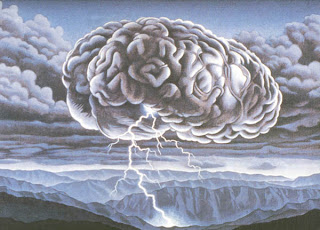 Nicely done!
Nicely done!
fsuinvention
Thursday, October 21, 2010
Inventing Invention: The Penultimate Class
 Questions.
Questions.Did the terms function as a heuristic?
Were the terms hermeneutical in the sense that you were drawing on your reading? (Which raises an interesting question about how close to the text one has to be in order for a invention process to be hermeneutical.)
Berthoff talks about killer dichotomies: at what point, if ever, does the heuristic/hermeneutical divide become such a dichotomy? And if so, how do we address that? By seeing connections between the two? By adding new terms?
We did talk about technology and its relationship to invention, but of course technology has always been a factor. Was it simply an unacknowledged factor that should have been included, or is there something particularly pressing about technology now that makes it a visible part of invention?
Tuesday, October 19, 2010
Collective Invention
Sunday, October 17, 2010
Remix Culture
 Speaking of materiality, here is a review of
Speaking of materiality, here is a review ofRobert Rauschenberg's art:
http://www.artnet.com/magazineus
In terms of its inventness, the art is interesting.
Does it have implications for composition?
Saturday, October 9, 2010
Digital Invention
Wednesday, October 6, 2010
Define 5 canons; List invention strategies
I am putting my comment as a new post: I want to continue from yesterday but not sure if folks will go back to our answer page or not--
Kara and Natalie approach the question I am asking- Matt kind of makes this point too--- and I'm sure all of us want to get a grip on how much theory to give, say freshman, but anyone really who is not in our graduate-level rhet/comp track.
I think it would be helpful (to me at least!) if we went over the FIVE canons and defined them succinctly, ranking them hierarchically if necessary-- or nesting them? HELP!
Also-- if we made a list of 10 (do we use that many distinct ones? Or is it more like six?) invention strategies as a seminar group- that we all use in our teaching. Sort of like an annotated bib, and following up/streamlining our discussion yesterday.
Kara and Natalie approach the question I am asking- Matt kind of makes this point too--- and I'm sure all of us want to get a grip on how much theory to give, say freshman, but anyone really who is not in our graduate-level rhet/comp track.
I think it would be helpful (to me at least!) if we went over the FIVE canons and defined them succinctly, ranking them hierarchically if necessary-- or nesting them? HELP!
Also-- if we made a list of 10 (do we use that many distinct ones? Or is it more like six?) invention strategies as a seminar group- that we all use in our teaching. Sort of like an annotated bib, and following up/streamlining our discussion yesterday.
Saturday, October 2, 2010
Whither Invention in the Classroom

So one take-away from this reading is that there are many theories of invention, another
that there are several theories of pedagogical uses of invention.
So several questions: please
1. Choose one (!)
2. Respond to it
3. In the process of responding, connect to other posts responding to the same question.
First Question: Some say that it's better (i.e., more helpful) inside a course to focus on a *single* invention technique so that students "master" it completely. Others say that it's more helpful to design several intention strategies into the course, the idea being that different assignments call for different techniques and that not all students will thrive with a single model. What do you say, and why?
Second Question: How much should fyc students know about invention as a topic/content area? In most fyc classes, invention is taught as a part of process. It's not taught, in other words, as a content area, although, clearly, it could be. Should it? Yes, no, maybe, and why?
Third Question: You could make the argument that you all should know something about invention because each of you is claiming some expertise in rhetoric, and the rhetorical canons, are, well, canonical ;) How much about invention should TAs teaching fyc know, and why?
Fourth Question: So what's the relationship, if any, between/among invention, curriculum, and pedagogy? Does a given fyc curriculum lend itself to one or more specific invention techniques? If yes, can you give us an example and and rationale?
Looking forward. . .
ky
Subscribe to:
Posts (Atom)



